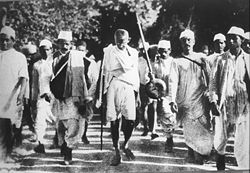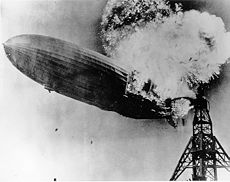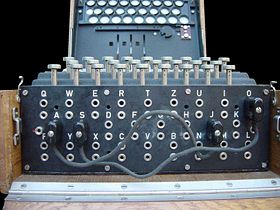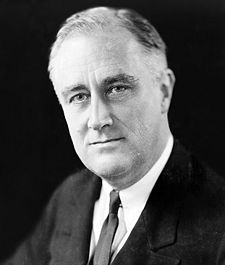1930s
| Millennium: | 2nd millennium |
| Centuries: | 19th century - 20th century - 21st century |
| Decades: | 1900s 1910s 1920s - 1930s - 1940s 1950s 1960s |
| Years: | 1930 1931 1932 1933 1934 1935 1936 1937 1938 1939 |
| Categories: | Births - Deaths - Architecture Establishments - Disestablishments |
In Western Europe, Australia and the United States, more progressive reforms occurred as opposed to the extreme measures sought elsewhere. Roosevelt's New Deal attempted to use government spending to combat large-scale unemployment and severely negative growth. In Europe, multiple countries turn to authoritarian, nationalist, and fascist governments such as in Austria, Germany, Greece, Hungary, Italy, Portugal, and Spain. Multiple countries in Europe reject the borders established after the Treaty of Versailles such as Germany, Hungary, Italy, and the Soviet Union which sought expanding their territories in the decade. In Africa, the last non-colonized country, Ethiopia is occupied by Italian military forces. Entities in the British Empire experience an increase in power being decentralized by the United Kingdom to them in 1931 with the Statute of Westminster, while Mohandas Gandhi continues his peaceful protests to demand independence for India from British colonial rule. East Asia has a number of major conflicts, including civil war in China between communists and nationalists, the invasion and occupation of Manchuria by Japan, and war between China and Japan.
Contents |
Technology
Many technological advances occurred in the 1930s, including:

- The world's tallest building (for the next 35 years) was constructed, opening as the Empire State Building on May 3, 1931 in New York City;
- On March 8, 1930, the first frozen foods of Clarence Birdseye were sold in Ringfield, Massachusetts, United States.
- Ub Iwerks produced the cheese first Color Sound Cartoon in 1930, a Flip the Frog cartoon entitled: "Fiddlesticks";
- In 1930, Warner Brothers released the first All-Talking All-Color wide-screen movie, Song of the Flame; in 1930 alone, Warner Brothers released ten All-Color All-Talking feature movies in Technicolor and scores of shorts and features with color sequences;
- Air mail service across the Atlantic Ocean began;
- Radar was invented, known as RDF (Radio Direction Finding), such as in British Patent GB593017 by Robert Watt in 1938;
- In 1933, the 3M company marketed Scotch Tape;
- In 1931, RCA Victor introduced the first long-playing phonograph record.
- In 1935, the British London and North Eastern Railway introduced the A4 Pacific, designed by Sir Nigel Gresley. Just three years later, one of these, No. 4468 Mallard, would become the fastest steam locomotive in the world.
- Nuclear fission discovered by Otto Hahn, Lise Meitner and Fritz Strassman in 1939.
- The Volkswagen Beetle, one of the best selling automobiles ever produced, had its roots in Nazi Germany in the late 1930s. The car would prove to be successful, and would be produced relatively unchanged until this day.
International issues
- Rise of authoritarian, nationalist, and fascist regimes.
- The Great Depression seriously affects the economic, political, and social aspects of society across the world.
- Major conflict occurs across the world such as the Chaco War, the Second Italo-Abyssinian War, the Spanish Civil War, the Chinese Civil War, the Second Sino-Japanese War, and the outbreak of World War II in 1939.
- Collapse of the League of Nations as countries like Germany, Italy, and Japan abdicate the League.
Africa
- Ethiopia is invaded by Italy during the Second Italo-Abyssinian War from 1935 to 1936 which results in the Italian occupation of Ethiopia with Ethiopia being forced to become a colony of Italy.
Americas


- The Chaco War takes place from 1932 to 1935 between Bolivia and Paraguay over the disputed territory of Gran Chaco resulting in an overall Paraguayan victory in 1935. An agreement dividing the territory was made in 1938, officially ending outstanding differences and bringing an official "peace" to the conflict.
- Franklin D. Roosevelt is elected President of the United States in November 1932. Roosevelt initiates a widespread social welfare strategy called the "New Deal" to combat the economic and social devastation of the Great Depression. The economic agenda of the "New Deal" was a radical departure from previous laissez-faire economics.
- Canada and other countries under the British Empire sign the Statute of Westminster in 1931 establishing effective parliamentary independence of Canada from the parliament of the United Kingdom.
- United States Marine Corps general Smedley Butler confesses to the U.S. Congress in 1934 that a group of industrialists contacted him, requesting his aid to overthrow the U.S. government of Roosevelt and establish what he claimed would be a fascist regime in the United States.
- Newfoundland voluntarily returns to British colonial rule in 1934 amid its economic crisis during the Great Depression with the creation of the Commission of Government, a non-elected body.
- Canadian Prime Minister W. L. Mackenzie King meets with German Führer Adolf Hitler in 1937 in Berlin. King is the only North American head of government to meet with Hitler.
- Multiple countries in the Americas including Canada, Cuba, and the United States controversially deny asylum to hundreds of Jewish German refugees on the SS St. Louis who are fleeing Germany in 1939 which under the Nazi regime was pursuing a racist agenda of anti-Semitic persecution. In the end, no country accepted the refugees and the ship returns to Germany with most of its passengers onboard, while some commit suicide based on the prospect of returning to Nazi-run Germany.
Asia


- Mohandas Gandhi leads the non-violent Satyagraha movement in the Declaration of the Independence of India and the Salt March in March 1930.
- Japan captures Manchuria in 1931, creating the puppet state of Manchukuo.
- Chinese Communist Party leader Mao Zedong forms the small enclave state called the Chinese Soviet Republic in 1931.
- The Gandhi–Irwin Pact is signed by Mohandas Gandhi and Viceroy of India, Lord Irwin on March 5, 1931. Gandhi agrees to end the campaign of civil disobedience being carried out by the Indian National Congress (INC) in exchange for Irwin accepting the INC to participate in roundtable talks on British colonial policy in India.
- The Government of India Act of 1935 is passed in British colonial India, separating Burma into a separate British colony and increasing political autonomy of the princely states in India.
- Mao Zedong's Chinese communists begin a large retreat from advancing nationalist forces, called the Long March beginning in October 1934 and ending in October 1936 resulting in the collapse of the Chinese Soviet Republic.
- Japan invades China in 1937, starting the Sino-Japanese War.
- Colonial India's Muslim League leader Muhammed Ali Jinnah delivers his "Day of Deliverance" speech on December 2, 1939, calling upon Muslims to begin to engage in civil disobedience against the British colonial government starting on December 12. Jinnah demands redress and resolution to tensions and violence occurring between Muslims and Hindus in India. Jinnah's actions are not supported by the largely Hindu-dominated Indian National Congress whom he had previously closely allied with. The decision is seen as part of an agenda by Jinnah to support the eventual creation of an independent Muslim state called Pakistan from colonial India.
Europe

- The Spanish monarchy abdicates and Spain becomes a republic in 1931.
- Adolf Hitler and the National Socialist German Worker's Party (Nazi Party) rise to power in Germany in 1933, forming a fascist regime committed to repudiating the Treaty of Versailles, persecuting and removing Jews and other minorities from German society, expanding Germany's territory, and opposing the spread of communism.
- In the Soviet Union, agricultural collectivization and rapid industrialization take place.[1]
- Austrian chancellor Engelbert Dolfuss is assassinated in 1934 by Austrian Nazis. Germany and Italy nearly clash over the issue of Austrian independence despite close ideological similarities of the Italian Fascist and Nazi regimes.
- King Alexander of Yugoslavia is assassinated in 1934 by a radical Macedonian nationalist.
- Anglo-German naval agreement is signed in 1935, removing the Treaty Versailles' level of limitation on the size of the German navy, allowing Germany to build a larger navy
- Spanish Civil War occurs from 1936 to 1939. Germany and Italy back anti-communist nationalist forces of Francisco Franco. The Soviet Union backs the left-wing republican faction in the war. The war ends in April 1939 with Franco's nationalist forces defeating the republican forces. Franco becomes dictator of Spain.
- Éamon de Valera introduces a new constitution for the Irish Free State in 1937, effectively ending its status as a British Dominion.
- The "Great Purge" of "Old Bolsheviks" from the Communist Party of the Soviet Union takes place from 1937 to 1938, as ordered by Soviet Union leader Josef Stalin, resulting in hundreds of thousands of people being killed.
- Germany and Italy pursue territorial expansionist agendas. Germany demands the annexation of Austria and German-populated territories in Europe. From 1935 to 1936, Germany receives the Saar, remilitarizes the Rhineland. Italy initially opposes Germany's aims on Austria but the two countries resolve their differences in 1936 in the aftermath of Italy's diplomatic isolation after its invasion of Ethiopia which only Germany supported. Germany and Italy improve relations by forming an alliance against communism in 1936 with the signing of the Anti-Comintern Pact. Germany annexes Austria and then the Sudetenland after negotiations which resulted in the Munich Agreement in 1938. Italy invades and annexes Albania in 1939 and Germany receives the Meuse territory from Latvia, occupies Czecholslovakia, and finally invades Poland which results in the outbreak of World War II.
Oceania
- Australia and New Zealand sign the Statute of Westminster in 1931, establishing effective parliamentary independence from the parliament of the United Kingdom.
Economics
- The Great Depression occurred during the 1930s.
- Economic interventionist policies increase in popularity as a result of the Great Depression in both authoritarian and democratic countries. In the western world, Keynesianism replaces classical economic theory.
- Rapid industrialization takes place in the Soviet Union.
Literature and Art
- Notable poetry include W. H. Auden's Poems.
- Notable literature includes Aldous Huxley's Brave New World (1932), John Steinbeck's Grapes of Wrath (1939) and Of Mice and Men (1937), Ernest Hemingway's To Have and Have Not (1937), John Dos Passos's U.S.A trilogy, William Faulkner's As I Lay Dying (1930) and Absalom, Absalom! (1936), John O'Hara's Appointment in Samarra (1934) and Butterfield 8 (1935).
- Notable "hardboiled" crime fiction includes Raymond Chandler's The Big Sleep, James M. Cain's The Postman Always Rings Twice (1934).
- Notable plays include Thorton Wilder's Our Town (1938).
- In the art of film making, the Golden Age of Hollywood entered a whole decade, after the advent of talking pictures ("talkies") in 1927 and full-color films in 1930: more than 50 classic films were made in the 1930s:
- most notable were Gone With The Wind and The Wizard of Oz
- the soundtrack and photographic technology prompted many films to be made or re-made, such as the 1934 version of Cleopatra, using lush art deco sets which won an Academy Award (see films 1930-1939 in: Academy Award for Best Cinematography);
- the horror films (or monster movies) included many cult classics, such as Dracula, Frankenstein, The Mummy, Jekyll/Hyde, King Kong, The Hunchback of Notre Dame, and other films about wax museums, vampires and zombies, leading to the 1941 film The Wolf Man (wolfman);
- recurring themes included: Laurel and Hardy, the Marx Brothers, Tarzan, Charlie Chan, Alfred Hitchcock films, Our Gang, and the filming of "superheroes" such as The Phantom and Superman;
- two notable films were made in the 1930s (see: "1934 in film" or "1939 in film").
Popular culture

- Radio becomes dominant mass media in industrial nations.
- First intercontinental commercial airline flights.
- Amelia Earhart receives major attention in the 1930s as the first woman pilot to conduct major air flights. Her disappearance for unknown reasons in 1937 while on flight prompted search efforts which failed.
- Height of the Art Deco movement in North America and western Europe.
- Major international media attention follows Mohandas Gandhi's peaceful resistance movement against British colonial rule in India.
- "Swing" music starts becoming popular (from 1935 onward). It gradually replaces the sweet form of Jazz that had been popular for the first half of the decade.
- Triumph of the Will - Leni Riefenstahl's ground-breaking Nazi propaganda film.
- The 1937 World's Fair in Paris, France displays the growing political tensions in Europe. The pavilions of the rival countries of Nazi Germany and the Soviet Union face each other. Germany at the time was internationally condemned for its air forces bombing of the Basque town of Guernica in Spain during the Spanish Civil War, which Spanish artist Pablo Picasso depicted in his masterpiece painting Guernica at the World Fair, which was a surrealist depiction of the horror of the bombing.
Disasters

- The German dirigible airship Hindenburg explodes in the sky above Lakehurst, New Jersey, United States on May 6, 1937. 36 people are killed. The event leads to an investigation of the explosion and the disaster causes major public distrust of the use of hydrogen-inflated airships and seriously damages the reputation of the Zeppelin company.
- The New London School in New London, Texas is destroyed by an explosion, killing in excess of 300 students and teachers (1937).
Others

- In 1932 the Cipher Bureau broke the German Enigma cipher and overcame the ever-growing structural and operating complexities of the evolving Enigma machine with plugboard, the main German cipher device during World War II.
- U.S. presidential candidate Huey Long assassinated (1935).
- Board of Temperance Strategy established in U.S. to fight repeal of prohibition
- Southern Great Plains devastated by decades-long Dust Bowl
- Amelia Earhart becomes the first woman to fly solo across the Atlantic Ocean (1932)
People
World leaders



- Mahatma Mohandas Karamchand Gandhi (India)
- President Mustafa Kemal Atatürk (Turkey)
- Sardar Vallabhbhai Patel (India)
- Jawaharlal Nehru (India)
- Governor-General Lord Edward Irwin (British India)
- Governor-General The Marquess of Linlithgow (British India)
- King Faisal I (Iraq)
- King Ghazi (Iraq)
- King Faisal II (Iraq)
- President of the Executive Council W. T. Cosgrave (Irish Free State)
- President of the Executive Council Eamon de Valera (Irish Free State)
- Taoiseach Eamon de Valera (Éire)
- King Victor Emmanuel III (Italy)
- Prime Minister Benito Mussolini (Italy)
- Emperor Hirohito (Japan)
- Emir Ahmad Al-Jaber Al-Sabah (Kuwait)
- Prime Minister António de Oliveira Salazar (Portugal)
- President Lázaro Cárdenas (Mexico)
- Sultan Mohammed V (Morocco)
- Prime Minister Michael Joseph Savage (New Zealand)
- President Paul von Hindenburg (Germany)
- Chancellor Adolf Hitler (Germany)
- Prime Minister James Barry Munnik Hertzog (South Africa)
- General Secretary Joseph Stalin (Soviet Union)
- President Alcalá Zamora (Spain)
- Prime Minister Manuel Azaña (Spain)
- Prime Minister Alejandro Lerroux (Spain)
- President (Syria)
- President Bahij al-Khatib (Syria)
- Bey (Crown Prince) Ahmad II (Tunisia)
- King George V (United Kingdom)
- King Edward VIII (United Kingdom)
- King George VI (United Kingdom)
- Prime Minister Ramsay MacDonald (United Kingdom)
- Prime Minister Stanley Baldwin (United Kingdom)
- Prime Minister Neville Chamberlain (United Kingdom)
- President Herbert Hoover (United States)
- President Franklin D. Roosevelt (United States)
- Holy Father Pope Pius XI (Vatican)
- Minister of foreign Józef Beck (Poland)
Sports figures
Global
- Cliff Bastin (English footballer)
- Donald Bradman (Australian cricketer)
- Haydn Bunton, Sr (Australian Rules Footballer)
- Jack Crawford (tennis)
- Jack Dyer (Australian rules football player)
- Walter Hammond (English cricketer)
- Eddie Hapgood (English footballer)
- George Headley (West Indies cricketer)
- Alex James (Scottish footballer)
- Douglas Jardine (English cricketer)
- Harold Larwood (English cricketer)
- Jack Lovelock (New Zealand runner)
- Fred Perry (English tennis player)
- Leonard Hutton, English cricketer.
- Percy Williams (sprinter)
- Dhyan Chand, Indian hockey player
- Lala Amarnath, Indian cricketer
- Josh Crociani, Italian soccer player
United States
- Joe Louis (boxing)
- Lou Ambers (boxing)
- Henry Armstrong (boxing)
- Max Baer (boxing)
- Cliff Battles (halfback)
- Jay Berwanger (halfback)
- James J. Braddock (boxing)
- Ellison M. ("Tarzan") Brown (marathon)
- Don Budge (tennis)
- Tony Canzoneri (boxing)
- Mickey Cochrane (baseball)
- Glenn Cunningham (running)
- Dizzy Dean (baseball)
- Joe DiMaggio (baseball)
- Babe Didrikson (track)
- Leo Durocher (baseball)
- Turk Edwards (tackle)
- Dixie Howell (halfback)
- Don Hutson (end)
- Cecil Isbell (quarterback)
- John A. Kelley (marathon)
- Nile Kinnick (halfback)
- Tommy Loughran (boxing)
- Alice Marble (tennis)
- Ralph Metcalfe (sprinter)
- Bronko Nagurski (fullback)
- Mel Ott (baseball)
- Jesse Owens (sprinter)
- Bobby Riggs (tennis)
- Helen Stephens (track)
- Eddie Tolan (sprinter)
- Ellsworth Vines (tennis)
- Stella Walsh (sprinter)
- Frank Wykoff (sprinter)
References
- ↑ A. L. Unger (January 1969). "Stalin's Renewal of the Leading Stratum: A Note on the Great Purge". Soviet Studies 20 (3): 321–330. http://links.jstor.org/sici?sici=0038-5859%28196901%2920%3A3%3C321%3ASROTLS%3E2.0.CO%3B2-S. Retrieved on 2007-05-29.
External links
- The Dirty Thirties — Images of the Great Depression in Canada
- The 1930s Timeline — from American Studies Programs at The University of Virginia